The best customer service software for 2024
Customer service software helps businesses personalize customer interactions, building loyalty and revenue. Try an award-winning solution for free.
A complete guide to the best customer service software
By Heather Wintermantel, Senior Director, Customer Experience, Zendesk
Last updated October 30, 2024
Customer service software is the backbone of successful service operations. With 76 percent of customers expecting personalized service, generic one-size-fits-all support doesn’t cut it. You need tools that make communication seamless and agents effective if you want to keep customers satisfied. That, of course, starts by partnering with a stellar software provider.
Follow our guide for the basics of customer support software and details about the top customer service tools so you can find the right solution.
More in this guide:
- What is customer service software?
- The 17 best customer support platforms
- Comparison chart of the top customer service software platforms
- Features of customer service tools
- Benefits of customer support platforms
- Different types of software for customer support
- How to choose the right customer service software for your business
- Customer service software trends
- Frequently asked questions
- Try customer service software for free
What is customer service software?
Customer service software is a set of tools designed to help businesses track, manage, organize, and respond to customer support requests at scale.
Unlike a shared email inbox, customer service software contains a ticketing system that consolidates customer requests across channels, including email, live chat, messaging, and the phone. Support agents can utilize predefined ticket responses, collaborate on tickets, and automatically tag tickets so they are easily referenceable. A customer support system can also empower customers to self-serve via a knowledge base.
With advanced customer service tools—like reporting, analytics, and AI—support teams can automate repetitive tasks, gather insights, and make data-driven decisions to improve support operations.
Businesses often integratecustomer service tools with other systems, such as a billing or customer relationship management (CRM) platform, to create a 360-degree customer view and provide more personalized support.
The 17 best customer support platforms
Let’s drill into the best customer support tools and lay out the important details. Here, we’ll provide an overview of the software and a list of features, starting prices, and trial information.
1. Zendesk

Zendesk offers award-winning customer service software that empowers businesses to deliver fast and personalized customer support at scale.
Agents can seamlessly respond to customer requests across any channel from a single workspace, eliminating the need to switch between dashboards. They can see key information like a customer’s past support issues and seamlessly build a 360-degree customer view with over 1,500 plug-and-play integrations. Agents can also collaborate with other teammates and departments via Slack or Microsoft Teams directly within Zendesk.
AI is built into the agent workspace to help customer service teams manage greater ticket volumes while maintaining high customer satisfaction. AI can identify and label incoming tickets based on conversation priority, intent, sentiment, and language—as well as agent capacity, status, and skill—so they get routed to the right place. It also guides agents in real time, providing ticket summaries and tools to improve the tone of their replies. Our AI is built on over 18 billion real service interactions, so it understands customer service and enables you to unlock the power of personalized support from day one.
Advanced reporting and analytics help you determine how to operate more efficiently and identify changing customer needs so you can adapt quickly. Plus, with enterprise-class security features, you can ensure your customers’ data stays safe.
Our customer service software is easy to use, maximizing productivity and ensuring you can move at the speed of your customers. Simply put, Zendesk is a complete customer service solution that works right out of the box—without the need for developers or third-party consultants—resulting in a fast time to value and a low total cost of ownership.
Pricing: Plans start at $19 per agent/month. 14-day free trial available.
Explore more Zendesk pricing plans.
Take 30 seconds to start a free Zendesk trial or request a Zendesk demo.
2. Intercom
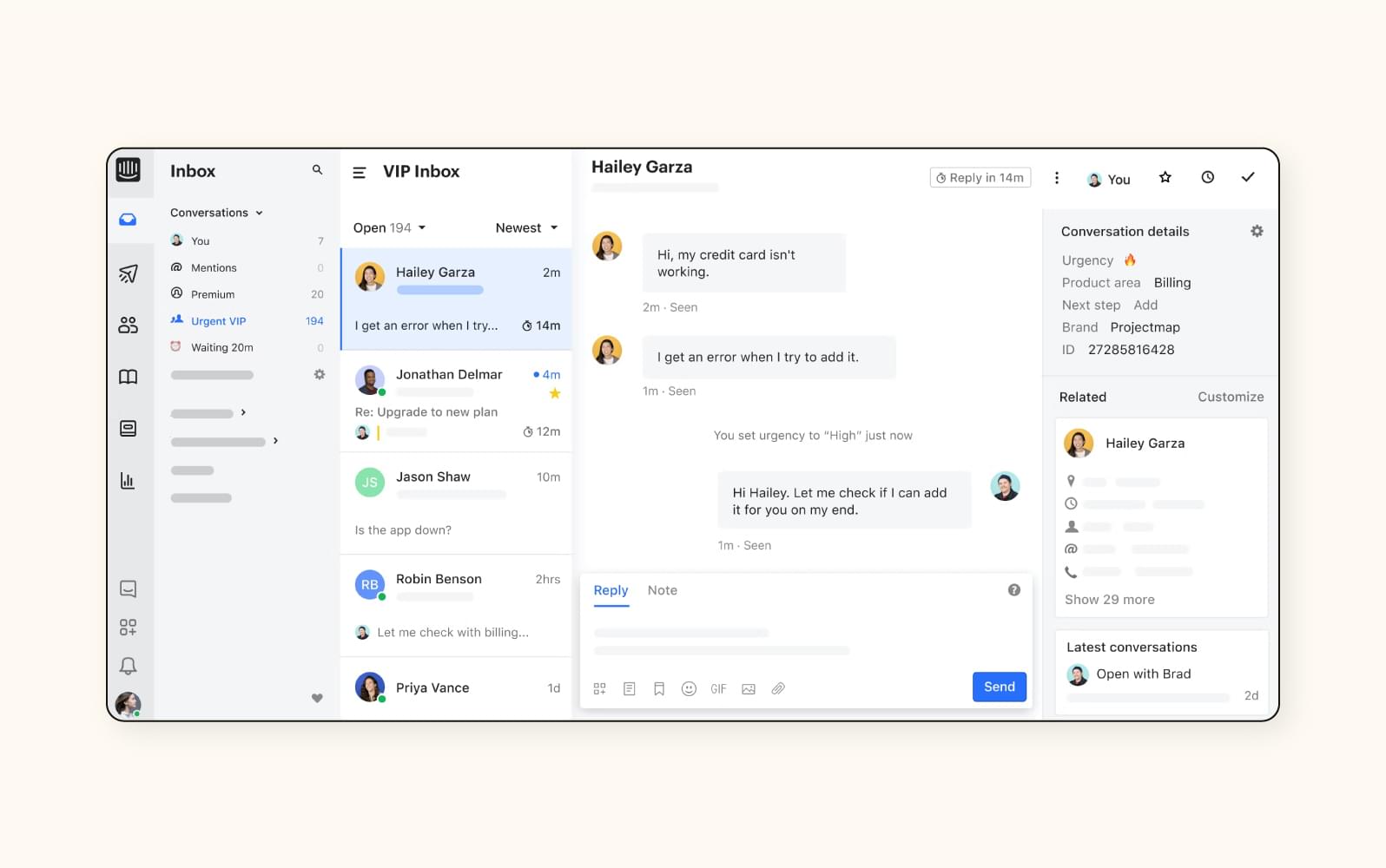
Intercom’s customer support solution uses automation and messaging to help internal customer service teams. Intercom Messenger works as a supplement to a business’s existing support tools. Intelligent routing lets businesses direct inquiries to specific agents based on skills, availability, and customer history.
The platform generates tickets through Messenger and other communication channels, such as email, and sends them to a shared inbox. Messenger can provide live support through chat or offer self-service options for customers to find answers at their own pace.
Intercom’s AI tool, Fin, offers conversational support by answering frequently asked questions or surfacing help center articles. Additionally, Fin can summarize conversations in the inbox and automatically populate ticket information. Intercom also features a marketplace with over 350 integrations.
Pricing: Plans start at $39 per seat/month. 14-day free trial available.
Recommended reading: Learn about the Intercom integration for Zendesk and how Zendesk vs. Intercom compare.
3. Salesforce Service Cloud

The customer service platform from Salesforce provides agents with an omnichannel workspace for customer support. Agents can view each ticket’s relevant context within their workspace, including customer contact details, prior interactions, and purchase history. The Swarming feature lets teams collaborate on cases by adding agents with specific skills to a dedicated Slack channel.
Salesforce Service Cloud lets agents customize workflows and automatically route tickets to the right support agent. Additionally, reporting and analytics features with prebuilt dashboards allow management to monitor team performance across channels. Reports can also include Swarming metrics like top responders and the percentage of open and closed cases.
Just note that Salesforce can be complex and may take users longer to learn. Because Salesforce isn’t exclusively a CX tool and offers a product suite for sales and marketing, businesses looking to level up their customer service may find it easier to achieve their goals with software specializing in the customer experience.
Pricing: Plans start at $25 per user/month. 30-day free trial available.
Recommended reading: Learn how Salesforce integrates with Zendesk and how Zendesk vs. Salesforce compare.
4. Front

Front is a customer service solution that allows users to configure automated workflows and integrate additional channels into a shared inbox. The shared inbox helps keep customer inquiries in one place. It automatically consolidates customer inquiries across channels and routes messages to the best-suited agent.
Each customer interaction gets logged, allowing agents who touch the account to access customer history for future customer support. Front includes built-in collaboration features so teams can communicate on tickets. It also features unified reporting for analytics on team performance and customer satisfaction.
Businesses can build a help center to assist with customer self-service. Knowledge base administrators can control user permissions to designate who can create, edit, and publish content. The help center also integrates with the live chat system so customers can toggle between self-service and customer support.
Pricing: Plans start at $19 per seat/month. 7-day free trial available.
Recommended reading: See how Zendesk vs. Front compare.
5. Tidio

Tidio is a customer service platform for small and midsize businesses. Featuring a help desk ticketing system, Tidio allows users to organize and manage customer requests in a shared inbox. The software can turn emails, live chats, and social media messages into tickets that route to the team inbox.
Tickets are also customizable, so users can add notes and create custom tags. Tidio can automatically assign tickets to agents and close them upon resolution. The software can also send an automated satisfaction survey once the interaction is over.
Tidio’s live chat tool features prewritten responses that help agents answer common questions. The chat window displays what customers are typing in real time, so the assigned agent can prepare a reply before the customer sends the message. Tidio also has a conversational AI chatbot, Lyro, that can assist customers with automated support.
Pricing: Plans start at $29 per month. A free plan and a 7-day trial are available.
6. Bitrix24
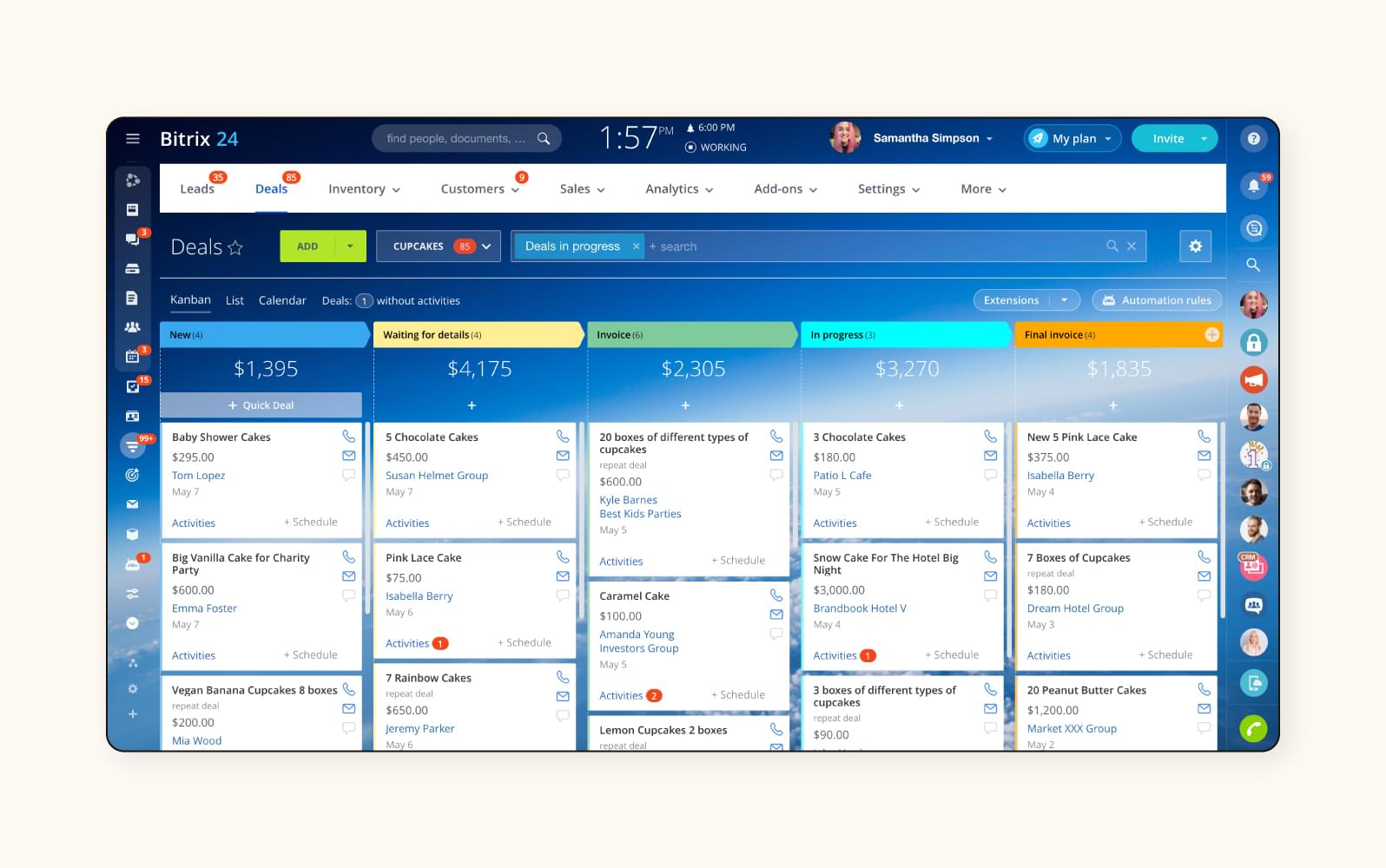
Bitrix24 offers online customer support software. The platform allows teams to provide omnichannel support and manage customer requests from a single location. Businesses can also configure it to queue the requests by channel. Additional customizations include creating prewritten responses and configuring wait time rules.
Every customer interaction from all channels gets logged into your CRM. The system collects customer data and creates a new lead if the customer does not have an existing profile. Bitrix24 also offers prebuilt and customizable activity reporting features.
Bitrix24’s built-in video calling allows agents and customers to connect face-to-face when resolving issues. With screen sharing and recording, agents can demonstrate solutions, walk customers through steps, and capture sessions for reference or training. There’s also videoconferencing for broader team collaboration, enabling group discussions with up to 48 people at a time.
Pricing: Plans start at $49 per organization/month. A free plan and a 15-day free trial are available.
7. HappyFox

HappyFox is a customer service solution and help desk management software provider. It features a ticketing system that helps teams organize requests and features a single customer view for omnichannel support. With automation, customizable workflows, and AI-powered chatbots, HappyFox helps automate everyday tasks.
Managers can use HappyFox to coordinate work schedules. They can define the work hours of their team and configure schedules to support service level agreements. The feature can also account for non-working hours when calculating time-based conditions.
HappyFox also offers self-service options, like an online knowledge base, so customers can find answers to questions without generating a support ticket. Customers can also track support tickets, engage in community forums, and refer to help center articles and FAQs—all within a single self-service portal.
Pricing: Plans start at $29 per agent/month. A free trial is available.
Recommended reading: Learn how HappyFox Workflows integrates with Zendesk.
8. Zoho Desk
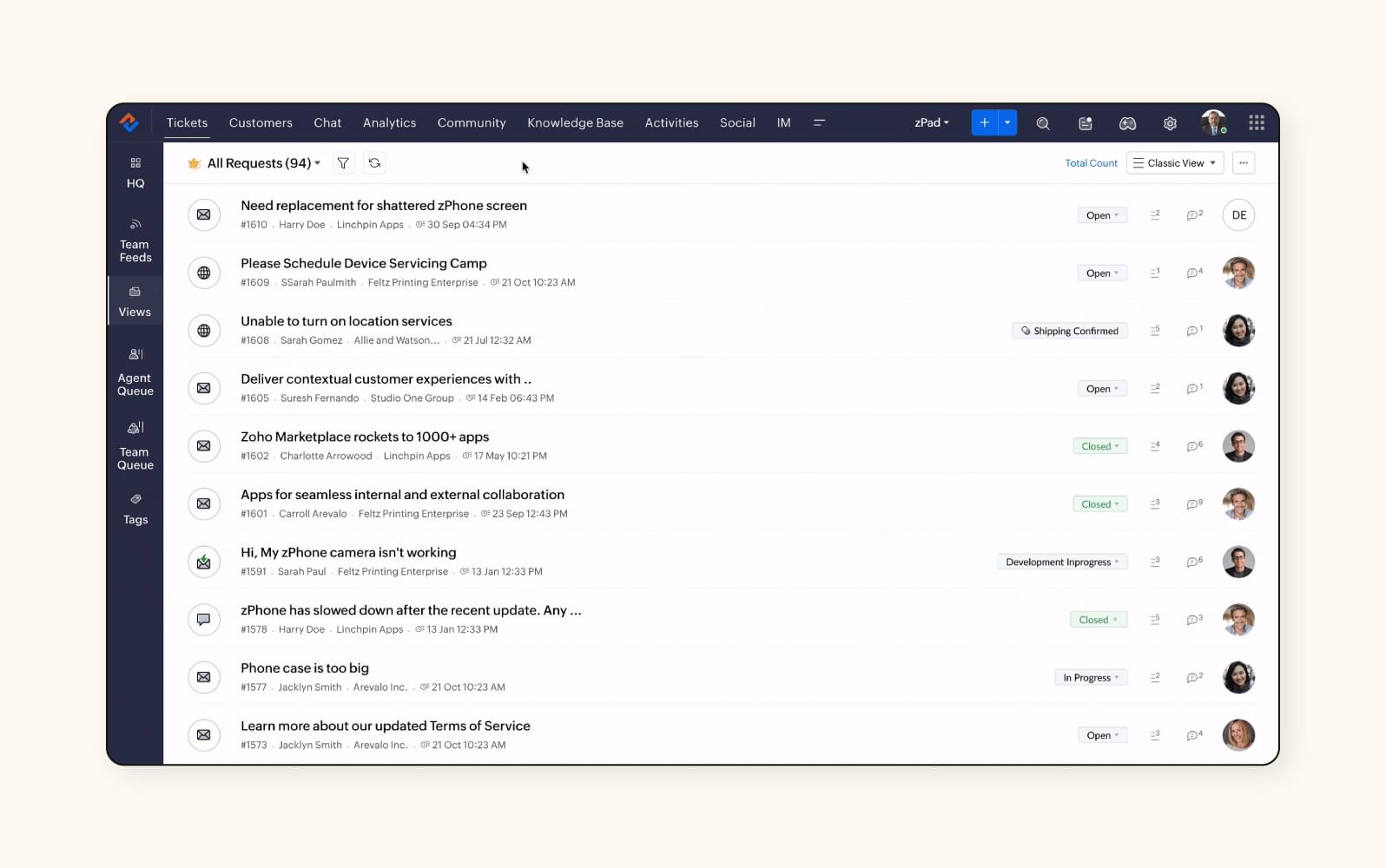
Zoho Desk offers customer support software with tools and automation options that automate agent workflows. For instance, Zoho Desk’s software provides omnichannel support with a single-view dashboard so agents can handle customer issues in one place. The ticket management system can organize tickets according to status, due date, and priority.
Other Zoho Desk features include self-service resources, SLAs, AI, an advanced response editor, and built-in analytics. The platform allows you to track customer data and generate reports with key performance metrics. Users can also create dashboards to visualize and track specific ticket metrics.
Zoho Desk also features an AI-powered assistant, Zia, which can detect how customers feel based on their language and automatically route tickets to agents with that context. Additionally, Zia can auto-tag tickets and notify agents when unusual activity takes place in the ticket workflow.
Pricing: Plans start at $7 per user/month. A free plan and a 15-day free trial are available.
Recommended reading: Learn how Zoho integrates with Zendesk and how Zendesk vs. Zoho compare.
9. ServiceNow

ServiceNow is a cloud-based customer service tool for enterprises. It features a customer self-service portal that allows users to create service requests or find help center articles without interacting with an agent. Customers can join community forums to ask questions and share their experiences.
Businesses can also automate workflows to help agents with repetitive tasks. Users can design processes to identify, log, resolve, and close incidents to avoid retyping information. Teams can also create cross-enterprise workflows that provide end-to-end views.
ServiceNow also offers customer service management (CSM) tools with generative AI technology. With its Now Assist tool, users can get AI-powered suggestions for responses. Additionally, ServiceNow’s AI offers suggestions to help agents take the next steps toward ticket resolution.
Pricing: Contact ServiceNow
Recommended reading: See how Zendesk vs. ServiceNow compare.
10. LiveAgent

LiveAgent is a customer service tool that focuses on live chat. It includes features like a real-time typing view, customer service website monitoring for chat engagement, and proactive chat invitations based on active agents and their availability. LiveAgent’s universal inbox collects help requests and routes them to specific agents.
Along with its chat tool, its help desk has built-in call center software with inbound and outbound capabilities, a ticketing system, a knowledge base, and reporting and analytics tools. Businesses can make call recordings, establish IVR flows, and monitor activity in real time. Customers can make callback requests instead of waiting on hold without losing their place in the queue.
Users can configure LiveAgent’s workflow automation tools with its Rules feature. Rules can automate routing, tagging, and ticket resolutions. LiveAgent is also customizable with a library of integrations to connect with third-party tools.
Pricing: Plans start at $9 per agent/month. A free plan and free trials of 7 or 30 days are available.
11. Freshdesk
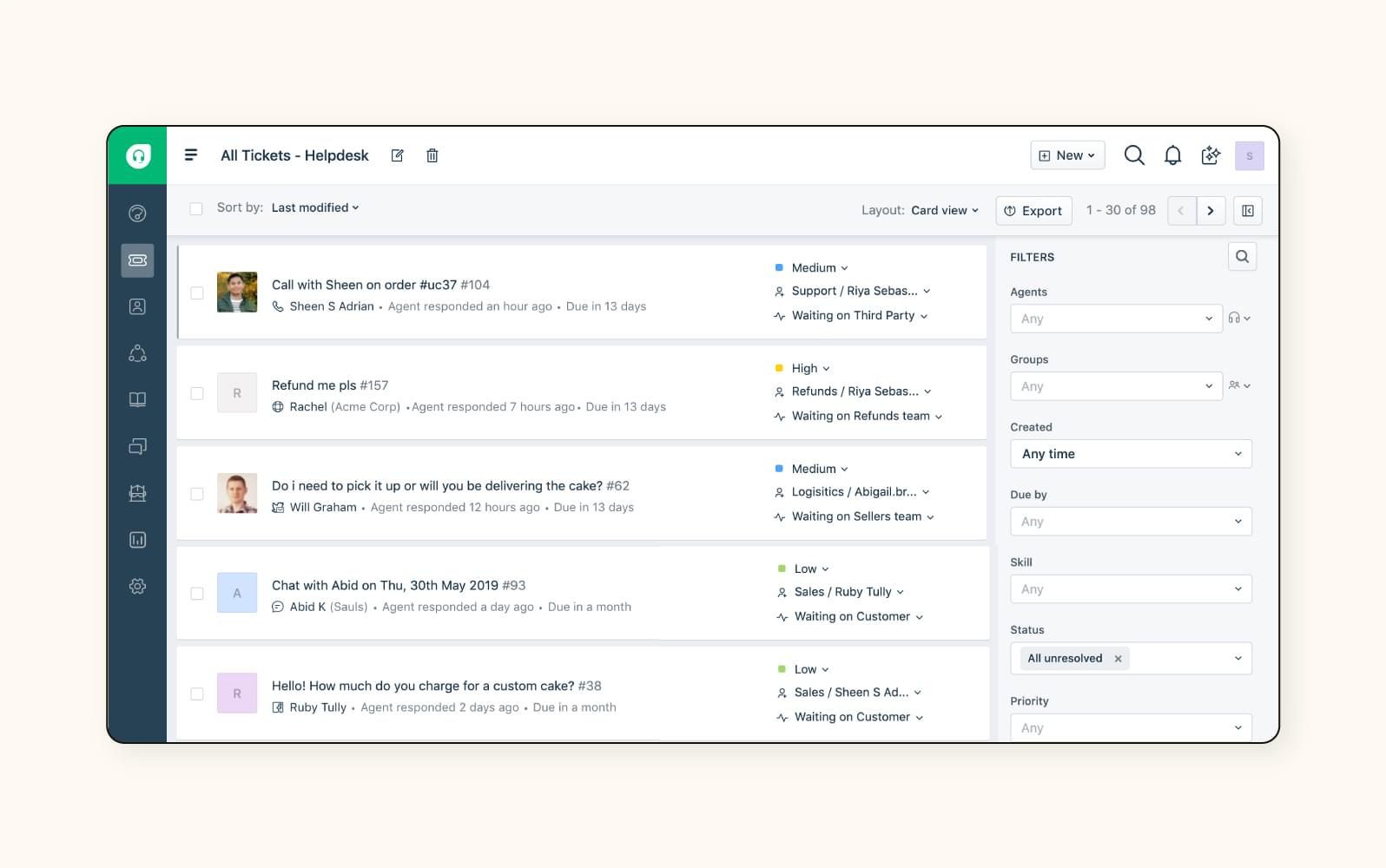
The Freshworks customer service product, Freshdesk, provides a platform for support teams to manage, prioritize, and respond to customer requests from a single location. Its ticketing system sends requests from across channels to a team inbox. Trend reports can help teams analyze ticket activity.
Users can configure ticket fields to automate routing, categorizing, and prioritizing incoming requests. Users can create custom ticket statuses that help agents see what stage the ticket is in. The system can also detect when a customer ends a conversation saying, “Thank you,” so the ticket isn’t accidentally reopened.
Note, however, that the Freshworks platform consists of three systems: Freshdesk, Freshchat, and Freshcaller. Each system has its own workspace, so agents must have each system open in an individual tab—requiring them to jump between windows to find customer information. This can slow customer service and cause agents to miss crucial information.
Pricing: Plans start at $15 per agent/month. A free plan and a 14-day free trial are available.
Recommended reading: See how Zendesk vs. Freshdesk compare.
12. Hiver

Hiver is a multichannel customer service help desk designed to work with Google Workspace. Rather than using a completely new platform, Hiver adds common customer service features to the company’s existing Google programs, including shared inboxes, analytics, and SLAs. Businesses that don’t want to reinvent their existing Google communications can use Hiver.
Hiver’s shared inbox has customizable views that allow users to choose conversation categories and filters to personalize the emails they see. With Conversation ID, users can track email threads by assigning them a number and resurfacing them on demand. It also features notes and @mentions (tagging) that enable users to collaborate without forwarding or copying them into the email thread.
Additionally, businesses can create a knowledge base to house FAQs, instructions, and troubleshooting guides. Customers can navigate through the articles using an embedded search bar. If readers can’t find what they’re looking for, they can submit a support ticket from within the knowledge base.
Pricing: Plans start at $15 per user/month. A 7-day free trial is available.
13. ProProfs Help Desk
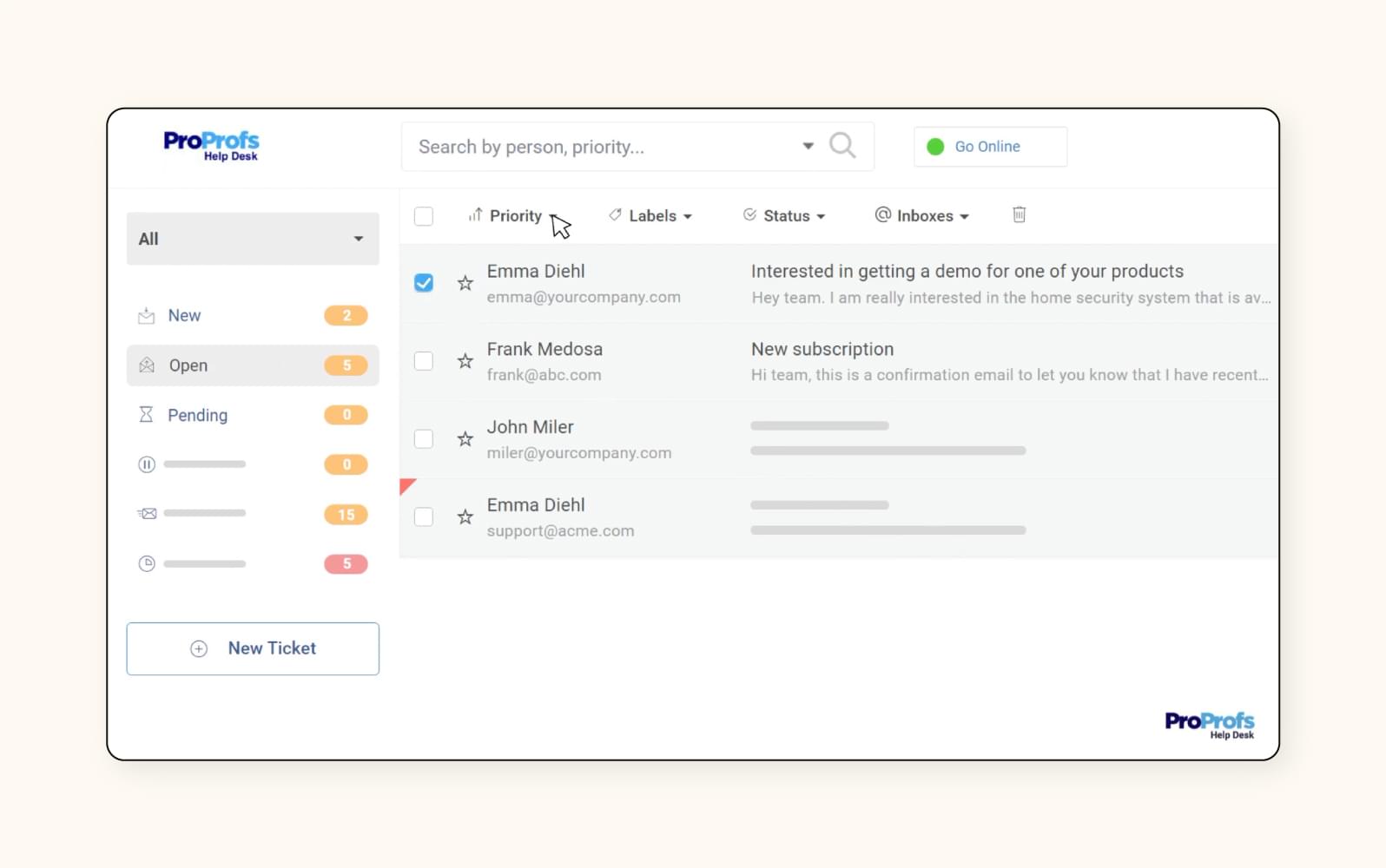
ProProfs offers a help desk for customer support. The software allows teams to manage, track, and close tickets. It includes a shared inbox for team collaboration, allowing agents to view conversations in one place. Agents can prioritize tickets, automate tasks, and tag teammates into the conversation.
Agents can view a customer’s ticket history and export conversations as PDFs. It also features private notes for users to collaborate through side conversations. Collision detection can help avoid having multiple agents unknowingly work on the same ticket.
Some of ProProfs’ additional features include a knowledge base for self-service, allowing customers to access articles and FAQs. And its live chat software allows for real-time support via a web widget. ProProfs also has surveys that help teams collect feedback and track customer satisfaction (CSAT).
Pricing: Plans start at $19.99 per operator a month. A free plan and a 15-day free trial are available.
Recommended reading: Recommended reading: Learn how ProProfs integrates with Zendesk.
14. Help Scout

Help Scout’s customer care software consolidates customer data, interactions, and customer history into a shared inbox, giving agents the appropriate context with each request. Its inbox also offers features like private notes for internal collaboration and collision detection to prevent two agents from working on the same issue simultaneously.
Help Scout’s AI tools include AI Summarize and AI Assist. AI Summarize helps users condense email threads into bullet points, while AI Assist suggests generated text while agents are typing out replies. AI Assist can also improve the content, change the tone, and translate it into other languages.
Businesses can administer short-form surveys and collect customer satisfaction ratings on their website or within their app. Additionally, Help Scout hosts an apps and integrations directory that offers over 100 integrations for support, marketing, e-commerce, communication, CRM, and analytics.
Pricing: Plans start at $20 per user/month. A 15-day free trial is available.
Recommended reading: See how Zendesk vs. Help Scout compare.
15. HubSpot Service Hub

HubSpot Service Hub offers a shared inbox that provides agents with customer history, ticket information, and queue details. HubSpot Service Hub connects with HubSpot’s CRM to sync information between its suite of tools. Agents can also work from a mobile inbox to stay active while on the move.
With HubSpot Service Hub, businesses can create customer portals and custom feedback surveys. The customer portal allows customers to view, open, and reply to their support tickets. Customers can also access the company knowledge base from the portal.
Users can automate follow-up responses based on survey results to gather more insights on the topic. Key performance metrics—like rep productivity, response time, and support volume—are available with the reporting and analytics dashboard. Each dashboard can house up to 30 reports.
Pricing: Plans start at $18 per month for two users. A free plan is available.
Recommended reading: Learn about HubSpot for Zendesk and how Zendesk vs. HubSpot compare.
16. Kustomer
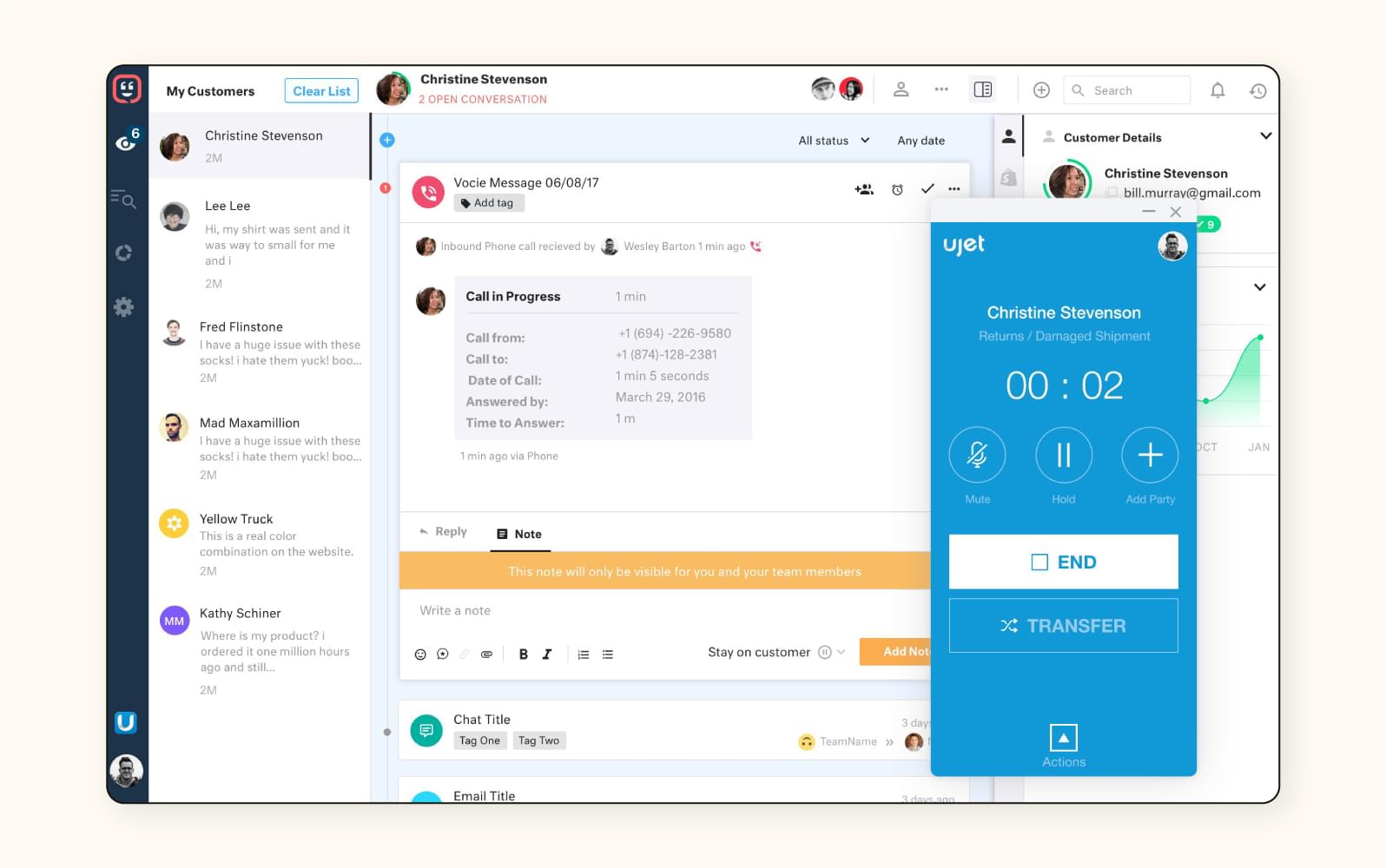
Kustomer is a customer service platform that can help support teams manage customer interactions. It consolidates customer data from multiple sources into a timeline view, providing agents with customer history, preferences, and interactions in a chronological conversation thread. Agents can access prewritten replies, suggested actions, and ticket tagging options.
Kustomer offers AI tools that use natural language processing to detect customer intent. It can analyze conversations and track customer sentiment so businesses can identify happy and sad customers. Support teams can also use Kustomer’s AI to classify and route conversations based on the customer’s historical data.
The platform includes live reporting and analytics dashboards displaying real-time customer service metrics. Kustomer can retain data for reporting for up to two years. Users can make one-time data exports or establish regularly scheduled report exports.
Pricing: Plans start at $89 per user/month.
Recommended reading: See how Zendesk vs. Kustomer compare.
17. Gorgias
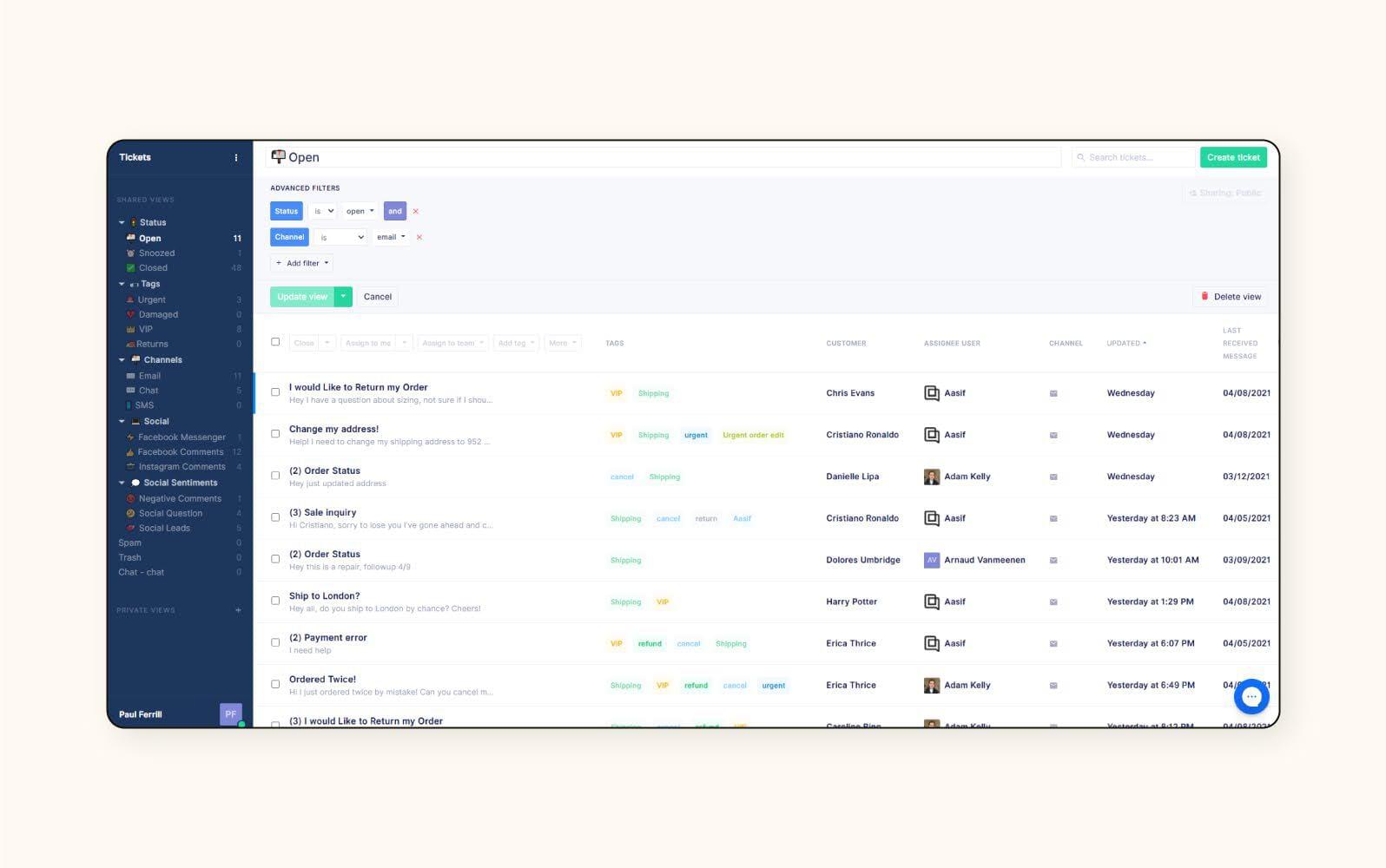
Gorgias is a customer service software solution that offers a help desk with a shared inbox system for support teams to collaboratively manage customer queries. Gorgias integrates with e-commerce sites, like Shopify, so agents can access customer details, such as customer data, order information, and order history.
The software offers automation features like AI-powered responses, prewritten responses for FAQs, and templates to handle repetitive inquiries. AI can scan incoming tickets to identify their intent. It automatically closes spam messages and answers legitimate requests, like order statuses.
Gorgias also has a customizable interface, allowing businesses to build workflows that automatically assign, tag, and close tickets. Prewritten responses allow agents to provide standardized answers to customers. The system can also accommodate rules that identify VIP customers to prioritize their requests.
Pricing: Plans start at $10 per month. A free trial is available.
Recommended reading: See how Zendesk vs. Gorgias compare.
Comparison chart of the top customer service software solutions
We've compiled a list of the best customer service software for 2024. Our comparison chart offers swift insights into pricing, free trial options, and key features so you can make informed decisions that align with your customer support needs.
| Customer service software | Starting price | Free trial | Key features |
|---|---|---|---|
| Zendesk | $19 per agent/month (billed annually) | 14 days |
|
| Intercom | $39 per seat/month | 14 days |
|
| Salesforce Service Cloud | $25 per user/month (billed monthly or annually) | 30 days |
|
| Front | $19 per seat/month (billed annually) | 7 days |
|
| Tidio | $0 per month (50 conversations) | 7 days |
|
| Bitrix24 | $0 per month (5 GB only) | 15 days |
|
| HappyFox | $29 per agent/month (billed annually) | Available |
|
| Zoho Desk | $0 per month (minimal support needs) | 15 days |
|
| ServiceNow | Contact ServiceNow | Unavailable |
|
| LiveAgent | $0 per month (limited features) | 7 or 30 days |
|
| Freshdesk | $0 per month (up to 10 agents) | 14 days |
|
| Hiver | $15 per user/month (billed annually) | 7 days |
|
| ProProfs Help Desk | $0 per month (single user) | 15 days |
|
| Help Scout | $20 per user/month (billed annually) | 15 days |
|
| HubSpot Service Hub | $0 per month (limited tools) | Unavailable |
|
| Kustomer | $89 per user/month | Unavailable |
|
| Gorgias | $10 per month | Available |
|
Features of customer service tools
While different customer support software may offer different tools, there are several core features most customer service (CS) software solutions provide. Here are a few of the top features to look for.

AI-powered help center
Not every customer issue requires a ticket or time with a customer service agent. Self-service options, including a help center and FAQ pages, let customers quickly find information without waiting on an available agent. These features also allow agents to spend more time on complex cases.
How it works for Zendesk: Iconic department store Liberty London implemented Zendesk AI to intelligently route incoming customer support conversations to the right team at the right time. Since partnering with Zendesk, Liberty has achieved $21,461 in annual help center savings.
“With Zendesk AI, I'm seeing an exciting opportunity to streamline and be more efficient. That will allow our team to have more time to work on projects of importance to the business, be it driving revenue or new sales channels.”
–Ian Hunt
Director of Customer Services at Liberty London
Unified omnichannel agent workspace
An omnichannel agent workspace provides a dashboard with a unified view of customer data, interactions across channels, and ticket history (aka the entire customer journey) for all departments to access. An omnichannel workspace allows businesses to meet customers where they are. It gives agents, management, sales reps, and anyone who interacts with consumers the context they need to deliver a high-quality customer experience at scale.
How it works with Zendesk: Global tool manufacturing giant Stanley Black & Decker needed to provide its support team with an omnichannel agent workspace to consolidate all customer interactions in one place. The company chose Zendesk because the software has an easy-to-use, omnichannel solution that can handle the massive volume of customer support requests at scale.
"We wanted a solution that integrated all channels, and that gave us the flexibility to implement in the way that we needed."
–Orlando Gadea Ros
Global VP Customer Experience Transformation at Stanley Black & Decker
Prebuilt and custom reporting
Customer tracking software and reporting tools let you measure and analyze customer history, behavior, and customer service metrics. This data is essential because it tracks how many requests you receive, how many tickets are open, when agents manage those tickets, and how satisfied the customer is with the experience. Most service desks with customer tracking and reporting tools will also auto-generate graph reports for simple viewing and analysis.
How it works for Zendesk: Zendesk provides omnichannel analytics that allows teams to drill into the metrics to better understand what’s behind the numbers. After implementing Zendesk, cosmetics retailer Lush achieved a 92% CSAT and increased its return on investment (ROI) by 369% in less than one year.
“Prior to Zendesk, I believe reporting out of customer care was sparse [to] non-existent.”
–Naomi Rankin
Global CX Manager at Lush
Integrations
The right integrations can help your team complete tasks faster and streamline internal and external communication. Consider customer service software that offers no-code integrations—like Slack, Zoom, and WhatsApp—that allow you to hit the ground running, as well as third-party integrations to supercharge your software. For example, Zendesk Marketplace offers more than 1,500 apps and integrations to help you create a 360-degree view of your customer.
Customizable platform
A fully customizable platform allows businesses to tailor their software to meet their organizational needs, now and in the future. Open and flexible software enables teams to unlock a plethora of customization options with apps and integrations, both code and no code. For example, businesses without developer budgets can utilize no-code integrations to quickly and easily extend the capabilities of their software. But companies wanting to create more complex use cases should consider an open platform like Zendesk Sunshine, which lets developers customize the code to their heart’s content.
The ability to customize enables businesses to create a 360-degree view of the customer by integrating CX data across systems and tools. This allows for more personalized customer service. Integrations also help you extend your CX software for different use cases and eliminate the need for agents to toggle between tools to get the information they need.
Benefits of customer support software
Customer service platforms can benefit companies of all sizes and types. From global enterprises to small businesses, customer support software can help teams in various ways. Here are a few benefits to consider.
Drive customer satisfaction, retention, and loyalty
Customers go out of their way to buy from brands they love—and stronger loyalty usually means more sales. Customer service software can facilitate better customer support practices, help your business meet the growing demand for personalization, and empower teams to achieve performance goals (like improved first reply time) that greatly influence customer satisfaction.
Customer service software that enables omnichannel support lets you meet the customer on their preferred channel for fast and convenient support, resulting in a better CX. Additionally, predictive analysis tools can anticipate potential issues based on ticket volume and customer behavior, helping you proactively address problems to prevent customer churn.
Reduce costs
Implementing tools—like self-service or AI and automations—helps businesses reduce costs by accomplishing more with less. Businesses can handle the same amount of inquiries by streamlining workflows, automating tasks, and allowing customers to help themselves without increasing headcount or sacrificing customer service quality.
Improve agent well-being and the employee experience
The right customer service tools can boost team morale and enhance the employee experience. Simplified and streamlined workflows, automated routine tasks, and intuitive workspaces create an environment that helps agents thrive. For example, AI chatbots can handle repetitive requests, so your support reps can focus on addressing more engaging questions and complex issues.
Agents will stick around and grow with companies that give them the best tools for the job, which comes with the additional benefit of reducing the costs associated with finding new talent to fill vacant roles.
Gain insights for informed decision-making
Customer service software with reporting and analytics tools and customer feedback mechanisms can provide valuable insights for decision-makers. With real-time reporting dashboards and omnichannel analytics, management teams gain visibility into ticket queues, team bandwidth, and performance.
This information allows management to see where teams or individual agents are excelling and where they may need to improve. They can also quickly determine where to allocate resources or make adjustments in real time to optimize workflows.
Boost productivity and efficiency
Customer service platforms with built-in AI and automation can improve team productivity by lending agents a helping hand and reducing manual work. For example, generative AI tools can streamline knowledge management by flagging articles that are ready for a refresh and helping agents write new pieces. AI can also quickly scan ticket content and provide a summary so agents can jump in and resolve the issue faster. Additionally, automation can ensure tickets get routed to the right agent for the task.
Different types of software for customer support
Customer support software can come in many forms, but the best solutions enable businesses to provide support across numerous channels and tools within a single workspace. Here are some primary resources businesses use to connect with and assist customers.
1. Phone (voice) support
Phone support software streamlines and enhances voice-based customer interactions. It typically includes intelligent call routing, call recording and transcription, caller ID and customer history display, and IVR. Phone support software can improve call resolution times, agent efficiency, and overall customer satisfaction by automating tasks and providing agents with real-time information.
The Salvation Army connected its phone and ticketing system so every incoming call automatically creates a new ticket. This allows agents to focus on serving the customer and avoids mistakes in the ticket creation process.
Suggested reading: The 10 best virtual call center software for 2024
2. Live chat
Live chat software provides a real-time chat interface for customer support interactions directly on business websites or mobile apps. It empowers agents to handle multiple chats simultaneously, reducing wait times. Live chat helps increase website conversions and improve customer satisfaction with timely and convenient support.
Upwork integrates its live chat with chatbots to deflect incoming requests to self-service resources. Now, only 42 percent of chat interactions require support team involvement.
3. Social media messaging
Social messaging software allows agents to interact with customers directly on social media platforms like Facebook, X (formerly Twitter), and Instagram. Agents can manage conversations, respond to messages, and resolve issues directly within the familiar social media environment. This type of software helps support teams meet customers where they already are, offering personalized and convenient support.
BoxyCharm uses social media messaging to gain an omnichannel view of its customers within its broader customer service system. Doing this has helped the team improve their response time and ensure all private social media tickets get resolved.
Suggested reading: 11 best social media customer service software of 2024
4. Email management
Email management software tackles the often overwhelming task of handling customer email inquiries. It offers features like automated ticket creation and routing, team collaboration tools, and prewritten responses.
The Georgia Housing Voucher Program (GHVP) used to manage emails with shared inboxes that made it difficult to take ownership of tickets and maintain accountability. Switching to an email management system allowed the GHVP to gain full visibility of its workflows. Staff can take control of email requests and communicate with coworkers when collaboration is required.
5. Text (SMS) messaging
Text messaging software enables businesses to interact with customers directly through text messages. This convenient and fast channel allows agents to send proactive updates on orders and appointments, answer quick questions, and offer support in bite-sized pieces.
Moving company Storage Scholars uses texting to deliver a more personal touch to customer interactions. While bots help deflect basic questions, knowing a human agent is available on the other end prompts customers to trust the company with their belongings.
Suggested reading: Best customer messaging software
6. Mobile SDK
Mobile SDKs (software development kits) are like tiny toolboxes for developers building customer service features directly into mobile apps. These kits provide prebuilt code and resources that simplify adding things like in-app chat, ticketing systems, or knowledge base access directly within a company's app.
Big Fish Games uses the Zendesk mobile SDK to embed its help center into game apps. The players can conveniently access knowledge base articles without leaving the app, leading to a more immersive playing experience.
7. Knowledge base software
Knowledge base software serves as a centralized hub for self-help information. This online library contains answers to common questions, step-by-step guides, and troubleshooting tips. Customers and agents can search through FAQs, articles, and even video tutorials to find solutions independently, reducing pressure on your support team.
Online marketplace MyDeal uses its knowledge base to help onboard new users. The team monitors customer inquiries and service tickets to inform which content to update or add to the knowledge base.
Suggested reading: Best knowledge base software for 2024
8. Community forums
Community forum software establishes a space for peer-to-peer support. Imagine a virtual town square where customers can ask questions, share experiences, and help each other. This software empowers customers to learn from each other and find user-generated solutions. Features often include discussion boards, topic categories, user profiles, and moderation tools.
Discord uses community forums to gauge user sentiment for possible updates to the service. Product teams quickly get customer feedback in a centralized place so they can prioritize which new features or fixes should come next.
Suggested reading: Best online forum software for 2024
9. Service desk software
Service desk software acts as the backbone of IT support, designed specifically to manage internal requests from employees or more technical customer issues. Employees can submit tickets for tech malfunctions, password resets, software access requests, and other IT-related needs. Service desk software streamlines workflows, offering features like ticket tracking, automated routing, prioritization, knowledge base access, and reporting.
Before Nottingham Trent University used service desk software, the IT department was considered an ineffective call center. The IT team struggled to track and close student requests. Adding Zendesk service desk software allowed the department to manage and close tickets efficiently. As a result, the organization increased its CSAT to 96 percent.
How to choose the right customer service software for your business
Your customer service software is critical to your support team’s day-to-day operations, so finding the right mix of tools is a big deal. Here are a few things to consider when choosing the right customer service software for your business.

- Consider time to value (TTV) and total cost of ownership (TCO): Fast TTV means your software is easy to set up and use, so you can quickly maximize the benefits. Vendor-supplied IT support helps manage updates and bug patches, so you don’t need an in-house dev team, leading to a low TCO.
- Ensure security and reliability: The software should have compliance certifications for cloud-based and on-premise servers, including application, data, network, and product security that offers two-factor authentication (2FA) and single sign-on (SSO) options. The solution should also be reliable, so you don’t have to worry about your data being compromised.
- Determine product scalability: The software needs an infrastructure to run smoothly while adapting to your ever-changing needs. Service desk software should have options to accommodate a growing company, like seamlessly adding or removing channels and integrating new systems and software.
- Utilize free trials: Free trials allow you to test software and assess its capabilities and usability before locking into a long-term investment. This information can help you determine if the software aligns with your business needs and if you can achieve your customer support goals.
- Explore quality support and partnership: Customer service software vendors should provide customer advocates to help businesses maximize their investment. The advocacy support team can answer questions and resolve issues throughout the lifetime of your plan.
Customer service software trends
The customer service software industry is experiencing a dynamic shift driven by evolving customer expectations and rapid technological advancements. Here are some emerging shifts in the landscape revealed in the Zendesk Customer Experience Trends Report 2024:
- AI is becoming a necessity: Nearly three-quarters of CX leaders intend to integrate generative AI into their touchpoints through 2026. They believe generative AI makes customer interactions more efficient, helping agents find information and solve problems faster.
- Chatbots are contributing to stronger customer relationships: Seventy-one percent of CX leaders consider bots to be skilled architects of personalizing customer journeys. Chatbots can be extensions of a company’s brand identity, resolving issues and building customer loyalty.
- Phone calls are still the preferred channel for resolving complex problems: Long wait times and frequent transfers are a major pain point for customers. Forty-one percent of CX leaders are increasing phone support budgets to satisfy customer expectations and serve them better.
- Organizations are adopting strategic management practices: Seventy-nine percent of businesses collaborate with external partners due to challenges related to forecasting staffing levels and overseeing performance. Managers understand that improving operational efficiency can lead to better customer experiences.
- Consumers are buying more when they speak with a representative: Conversion rates are nine times higher in a live chat than if the customer is left to browse the site on their own. Only 33 percent of businesses implement conversational commerce, but more than half are considering it
By embracing these trends, you can create a customer-centric environment that fosters loyalty and drives growth.
Frequently asked questions

Uber + Zendesk: Scaling through millions of trips since 2010
“Zendesk's ability to grow with Uber as we launched cities, scaled products, and built our support organization has been key to our customer service success story.”
Michael Mizrahi
Community Operations
Read customer storyTry customer service software for free
Seamless communication—personalized to your customers and centralized for your agents—doesn’t have to be just a dream for you and your team. With Zendesk, you get a customer service system that combines it all: integrated customer data, knowledge base management, ticketing, live chat, and much more. Start your free trial to see how we can help you elevate your customer experience.
Related customer service software guides
Continue your journey through the world of customer service software with these information-packed resources.
Related posts
Customer relations 101: Beginner’s guide to building relationships
Understand the ins and outs of customer relations to improve your customer experience, raise profits, and boost brand credibility.
What is customer service?
Customer service is the support you offer customers throughout a business relationship. Learn why it’s important and assess your own customer service aptitude.
What is customer experience? A comprehensive guide for 2025
Customer experience refers to all the interactions between a business and its customers. Learn why it's essential and how you can improve your CX strategy.
34 customer service email templates + best practices
Use these customer service email templates to provide faster and more consistent responses to customers.
